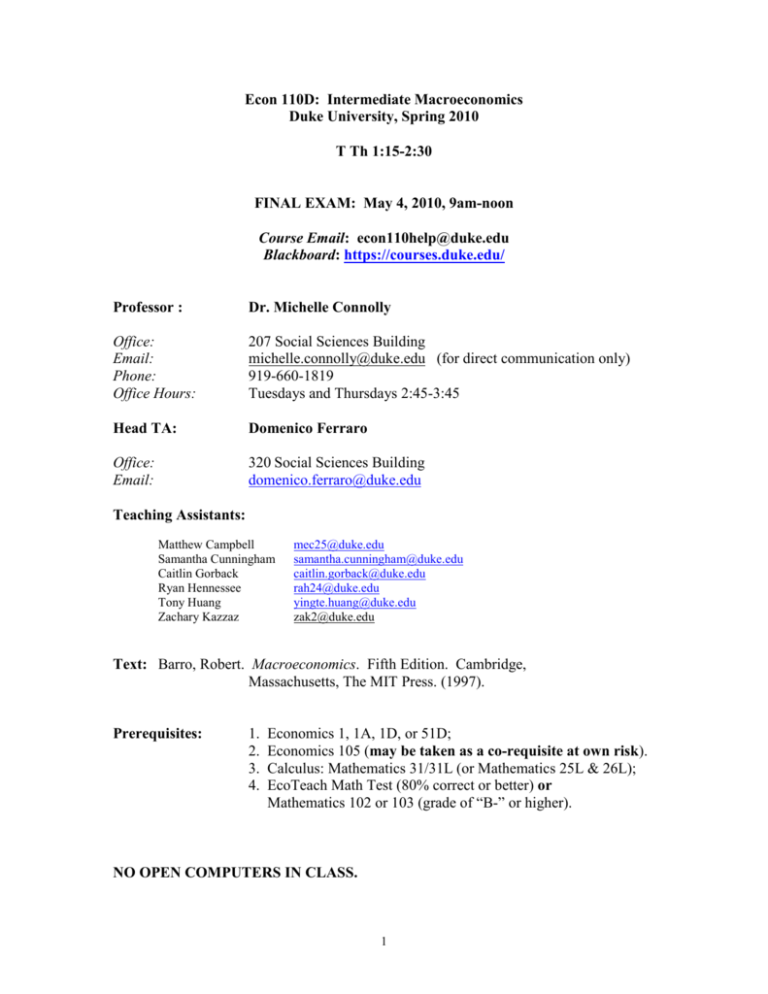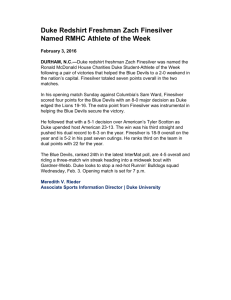Econ 154: Intermediate Macroeconomics
advertisement

Econ 110D: Intermediate Macroeconomics Duke University, Spring 2010 T Th 1:15-2:30 FINAL EXAM: May 4, 2010, 9am-noon Course Email: econ110help@duke.edu Blackboard: https://courses.duke.edu/ Professor : Dr. Michelle Connolly Office: Email: Phone: Office Hours: 207 Social Sciences Building michelle.connolly@duke.edu (for direct communication only) 919-660-1819 Tuesdays and Thursdays 2:45-3:45 Head TA: Domenico Ferraro Office: Email: 320 Social Sciences Building domenico.ferraro@duke.edu Teaching Assistants: Matthew Campbell Samantha Cunningham Caitlin Gorback Ryan Hennessee Tony Huang Zachary Kazzaz mec25@duke.edu samantha.cunningham@duke.edu caitlin.gorback@duke.edu rah24@duke.edu yingte.huang@duke.edu zak2@duke.edu Text: Barro, Robert. Macroeconomics. Fifth Edition. Cambridge, Massachusetts, The MIT Press. (1997). Prerequisites: 1. 2. 3. 4. Economics 1, 1A, 1D, or 51D; Economics 105 (may be taken as a co-requisite at own risk). Calculus: Mathematics 31/31L (or Mathematics 25L & 26L); EcoTeach Math Test (80% correct or better) or Mathematics 102 or 103 (grade of “B-” or higher). NO OPEN COMPUTERS IN CLASS. 1 Grading Scheme: Problem Sets ( 10): 2 Midterms: Final: Participation: 25% 20% each 35% half letter grade bonus to course grade for significant participation Honor Code: I expect all of my students to abide by the Duke University Community Standard. Further, I will report instances of academic dishonesty to the University Administration. All grades will be posted on blackboard. Check these regularly to confirm that you have appropriately received credit, especially for problem sets. NO MAKEUP EXAMS. YOU MAY DROP THE LOWEST MIDTERM EXAM GRADE. IF YOU DROP ONE MIDTERM, THE FINAL EXAM WILL COUNT FOR 55% OF YOUR GRADE. Whichever grading scheme gives you the highest grade will be automatically used in determining the class distribution and course grades. This means that on midterm exams the mean will be lower than that used to calculate the final course distribution since some students will have their midterm dropped. I.e. don’t get lulled into complacency if your midterm grade is slightly higher than the mean. Exam re-grade requests will only be accepted for exams taken in pen (not pencil). These requests must be typed and returned by the next class. The request must explain why you think a certain question is incorrectly graded. The entire exam will be re-graded by Professor Connolly and your grade can go up or down accordingly. If you ask me to re-grade a particular question, and I determine that your answer was graded correctly, then you automatically lose an extra point. Problem sets are due in class on Tuesdays. No late problem sets are accepted. Explanations determine grades. You may use the course email econ110help@duke.edu to ask for clarification of a question. You should NOT ask for help in answering your problem set questions. You must be officially enrolled in one section, but may attend any section or sections you want. Problem sets are returned in section so write which section you attend on your problem set under your name. Only the original grader of a problem set will consider any re-grading requests. If you wish to have the original grader re-grade, write out the problem you see with the current grading and resubmit the problem set and your request by the next class. Course grades are NOT NEGOTIABLE. It is INAPPROPRIATE (and honestly humiliating) to request special consideration at the end of the term with respect to your grade. I will answer any clarifying questions regarding grades but will not respond to attempts to negotiate grades. 2 TOPICS: I. Introduction Lecture Date: 01/14 Economic Modeling and Data Short Run vs. Long Run Classical Economics (Chapter 1) II. Robinson Crusoe Lecture Date: 01/19 Leisure and Consumption in a Static Model Substitution and Wealth Effects (Chapter 2) III. Credit Markets, Leisure and Consumption in a Dynamic Model 2.5 Lecture Dates: 01/21-01/28 Intertemporal Substitution Effects Theories of the Consumption Function Aggregate Supply and Demand Functions (Chapter 3) IV. Money Demand 3 Lecture Dates: 01/28-02/04 Chapters 4 and 17 V. The Basic Market Clearing Model Lecture Date: 02/09 Neutrality of Money (Chapter 5) MIDTERM I. Please bring 3 blue books. Date: 02/11 VI. Inflation 3 Lecture Dates: 02/16-02/23 Actual vs Expected Inflation Nominal vs Real Interest Rates Intro to Stabilization Plans for High Inflation Countries Anticipated vs. Unanticipated Changes in Monetary Policy (Chapters 7 and 8) VII. Investment, Firm Behavior, and Business Cycles 2 Target Lecture Dates: 02/25-03/02 Chapter 9 3 VIII. International Economics 2 Target Lecture Dates: 03/04-03/16 Current Account, International Debt Terms of Trade and Real Exchange Rate Determination Purchasing Power Parity, Interest Rate Parity, and Nominal Exchange Rate Determination (Chapters 15 and 16) MIDTERM II. Please bring 3 blue books. Target Date: 03/18 IX. Government and Fiscal Policy 5 Target Lecture Dates: 03/23-04/06 Public Spending (Chapter 12) Taxes, Transfers, and Distortions: The Laffer Curve and Supply Side Economics (Chapter 13) Debts and Deficits: Ricardian Equivalence Theorem of Debt Neutrality (Chapter 14) X. Long Run Economic Growth 4 Target Lecture Dates: 04/08-04/20 The Solow Model. Endogenous Growth Models. Conditional Convergence of Incomes across Countries and Regions. Technology and Technological Progress. Required Readings: Hall and Jones (1997), “Levels of Economic Activity Across Countries”, AER 87 (2): 173-177. Dollar and Kraay (2002), “Growth is Good for the Poor”, JEG 7 (3): 195-225. Acemoglu et al. (2001), "The Colonial Origins of Comparative Development: An Empirical Investigation", AER 91(5): 13691401. Rodrick et al. (2004), “Institutions Rule: The Primacy of Institutions Over Geography and Integration in Economic Development”, JEG 9 (2): 131-165. XI. Beyond Perfect Competition: Monopolistic Competition 2 Target Lecture Dates: 04/22-04/27 Current theories in economics that use this approach a. International Trade - Intra-industry trade b. Endogenous Growth Theory - R&D based endogenous growth c. Models of Technological Diffusion - Dynamic Trade Models, et al. FINAL EXAM: May 4, 2010, 9am-noon 4





